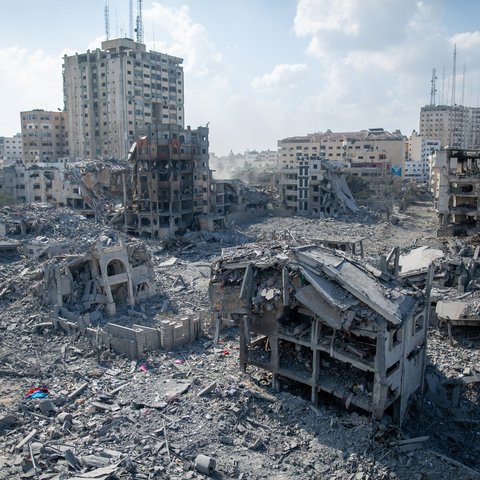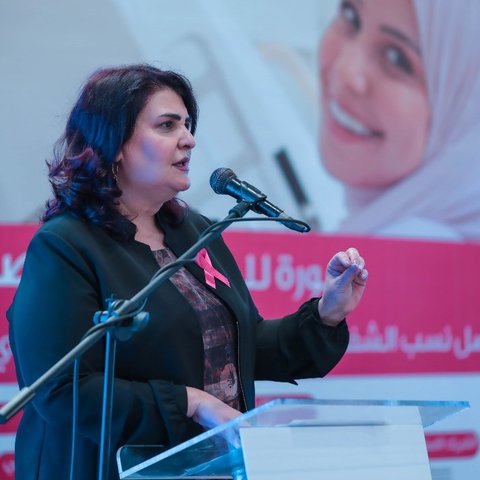“What is it that the world is waiting for, for this to stop?”: Diary from Gaza
Najla Shawa works for Oxfam in Gaza.
She's been sending us audio notes from the region, describing her fears for herself and her family's safety, the lack of supplies, and the trauma of living under constant violence.
Some of this content may be distressing.
7 October
Today with the bombing and the expected increase in bombing, handling my kids really is my priority. Handling how they deal with it… with the fear, with the physical potential damage, that is extremely worrying for me.
So me and my husband we’re just trying to keep them safe, keep food in, just manage their screams when they hear the bombings and trying to get them to sleep - that’s my biggest battle for the night.
8 October
The bombings and the intensity of the bombings was very heavy throughout the night.
There are no shelters in Gaza homes. And this makes it extremely hard, especially managing children.
I hardly slept last night… for a total of three hours…
We’ve learned that there’s at least 20,000 internally displaced people within the strip, who have fled to UN administered schools, UNRWA schools or with their family members or friends and acquaintances.
11 October
We have managed to sleep a couple of hours last night. The situation has been really difficult.
There were many places that were hit… families were killed and they stayed under the rubble for many, many hours.
We are extremely worried that what is happening now is totally unprecedented. You’re talking about entire areas, not just one area, like entire areas are being wiped, are being destroyed. As we speak now there was a bombing nearby...
Regarding water: we’re worried because we’re not getting [it], we’re getting less supply of water, and now we have a bigger family, we have about 12 people who have basically moved in with us in addition to my family. So we are trying to [ration] the use of water, and we hope we will manage to get some water, otherwise we may run out today. In terms of food supply, we still have and can still manage for a few days I would hope.
12 October
I am living with my family in addition to 12 people who are friends who came over three days ago to stay at our place because of destruction in their area.
We have no electricity from the grid. We have just electricity from our solar energy.
Last night we managed to sleep after a few hours...
Everyone I know is displaced. Either in a school or a public place or in a house of a relative. The situation is devastating and we are very worried. In terms of the attacks themselves, but also food and water.
13 October
Last night we slept for an hour or so.
We are receiving more people. We left our home, we packed a couple of suitcases for us, we are a family of five, and we had already those who evacuated and left their homes, so they were with us, there were about 12 people. They came with us, and now we are 44 in this place.
We had some food, we brought everything, but we have no idea what’s next, we have no idea what’s going to happen, if we are going to make it back to Gaza City, if we are going to make it back to our homes. That’s all I can say.
17 October
11am
In central Gaza we had some airstrikes last night. This morning some distant bombings were heard, and we’re now again trying to pump water to our tank.
We are now 57 [people], that’s the latest figure.
It’s really hard... we have solar panels and they save energy in batteries, but then they simply ran out, so it was total, total darkness. 20 kids sleeping with like 10 women in one room, and everyone else outside.
We have no information. Most, like 70 – 80% of my friends, are disconnected completely, there’s no internet. It takes me literally several hours to reach somebody on their mobile just to call, so you can imagine how little information we get about the situation in general.
[There are] thousands of people who are in a much worse situation - because now you hear me through this message, but imagine what you’re not hearing, and that’s usually more worrying.
2pm
It’s a struggle to really sleep, eat, clean, do all the basic stuff.
We are really living by the day and the situation changes by the hour so. For example, we ran out of water, and then we tried to go and find fuel to pump out of the well. Fuel is now very, very rare... for drinking water, already the quality of the water well is so bad that it’s not drinkable, and at the same time it’s another effort, another journey that takes us to find a water tanker.
We have neighbours who are coming to us to use electricity because we have solar panels, so we ended up being in total darkness by 9pm because although we have the batteries that store the electricity, they simply ran out because we have so many people.
In terms of the bigger picture, the biggest fear is that whenever we try to think about, a bit, [the] long term, it’s just so scary – are we going to go back to our homes or not? Are we going back to destroyed homes or not? Are we going to hear more bad news about people we know who are still in Gaza City or in different areas? Are we going to be directly hit?
So what is it that the world is waiting for, for this to stop? What is it that we’re waiting for?
We’re talking about a real crisis… people who are unable to use toilets in shelters, they hardly have water. [The World Food Programme] has announced today, what I read at least in local media, that food stocks are there only for four days in Gaza. So what is it that we’re waiting for?
October 22
We ran out of bread yesterday and the day before, so yesterday we had no bread.
It seems there’s no hope for bakeries to come back, because they were just bombed more than once, and they completely ran out of fuel when they tried to reopen it, so we don’t know…
We’re trying to really capture some news because we just had some internet, finally, after many hours of total disconnection. It might go back again to being fully disconnected.
We managed to get extra mattresses, and most of us are sleeping on mattresses now, but we don’t have enough space inside the building, so still some of us sleep outside in the cars.
October 23
[We’re in] a small house that has two rooms and two toilets, and we’re not connected to a public network in terms of water supply, but we have a water well. But the problem is that with the limited fuel supply we’ve been very conservative in pumping up water. So we’ve been taking showers using plastic bottles and also washing the dishes with minimal water consumption. [We have] 22 children in this place, it’s very hard to keep them calm, to keep actually adults [calm]. Children are coping in a way or another. Sometimes it’s very terrifying for them because of the bombings…
Definitely water is the biggest problem due to fuel. We don’t have any access to fuel, to cars, this also hinders our movement. Some of us here have cars but we move just on a critical basis. We have had several airstrikes along the different days, yesterday they were like artillery tank shelling... in addition to some airstrikes. There were heavy airstrikes also two days ago where also the main bakery was bombed.
It’s a very, very dangerous situation. It’s definitely one of the greatest emergencies that this area is apparently witnessing.
The situation in the shelters is more dramatic, as we are seeing and hearing about real public health concerns, due to water and overcrowdedness, and also women…and children are specifically vulnerable to such crises when there is no means for proper hygiene or privacy.
Also the level of stress that is affecting women when it comes to breastfeeding their children.
We are hearing all these kinds of situations.
October 24
Today I managed to go out to the town next to us to try and buy some essential clothing for my daughters and for myself.
There was bombing while we were out, but the street was still full.
We passed by UNWRA school and it had a scene I have never seen before, really, really sad. Big crowds at the entrance and big crowds inside. Windows full of laundry everywhere, the windows were like covered with little pieces you could see that thousands live there. At the entrance there were many people trying to get water from tankers, small water tanks at donkey carts being refilled manually, and small jerry cans as well. And on the side, not very far unfortunately, piles of garbage, and that’s what you see every couple of blocks, piles of garbage. It’s really heartbreaking, the crowdedness and the numbers of people who are kind of pushed to all these areas...
I considered myself very, very privileged and lucky, because I’m with just around 60 people in this place where, yes, it’s full of laundry, it’s full of piles of things like mattresses, blankets, food supplies, everything is on top of the other. We don’t have enough space inside to sleep, some of us, around 7 or 8 sleep outside, either in cars or the floor outside.
Five of the children within less than 24 hours had vomiting and a few had some diarrhoea. We hope that they are recovering and it’s just a virus. Of course the water that we drink here is from the water tankers that we are not super confident of the cleanliness of, it’s just desalinated water.
We had several rounds last night. Our sleep is of course never continuous, all night there has been tank shelling very close to here, and without any exaggeration I was just expecting one to just fall on top of me any second.
Today
The Gaza Israel conflict is a catastrophic humanitarian crisis. 2 million people are under siege, with little to no food, water, fuel or electricity. Oxfam is campaigning for an immediate and lasting ceasefire, and preparing to help the people of Gaza as soon as it’s safe.
You can support people in Gaza and Israel
- Sign the petition to call for a lasting ceasefire
- Donate to the Gaza emergency appeal
More posts like this

– Fidaa Alaraj works for Oxfam in Gaza. She's been sending us audio notes from the region.

– Eman Shannan founded Aid and Hope in 2009. It supports women with cancer in Gaza.Oxfam's Women's Rights Fund helps fund it.Eman has been updating us with voice notes from Gaza.

The situation in Gaza is fast-moving and at times confusing. Here's what's happening, and what you can do to help.